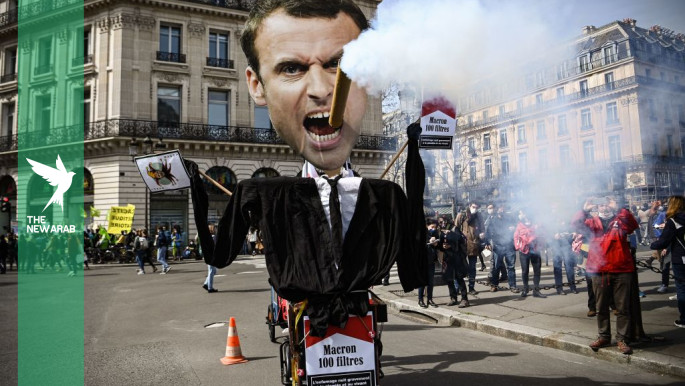Legal experts, too, expressed reservations about the charges brought against Hakim. [Getty]
For the French political left, the government’s decision to revoke the residency of a Moroccan man for lighting a cigarette from the eternal flame at the Tomb of the Unknown Soldier is less about patriotism and more about racism.
The controversy erupted after a video surfaced showing Hamdi Hakim, a 47-year-old homeless Moroccan man, crouching by the eternal flame beneath the Arc de Triomphe on 4 August, and lighting a cigarette before calmly walking away as tourists looked on.
The clip, filmed by a Latvian tourist and posted to TikTok, quickly went viral.
Hakim was arrested the following day and charged with violating a burial site, an offence punishable by up to one year in prison and a €15,000 fine (approximately $17,450) under French penal law.
Right-leaning media outlets were quick to point out that Hakim was known to police, with a reported 21 prior offences, including theft and racial insults.
Interior Minister Bruno Retailleau, a leading figure on the French right, framed the act as a grave insult to national memory. “This shameful and miserable act dishonours the memory of those who died for France,” he wrote on X.
Shortly after, the French radio network Europe 1 reported that Retailleau had revoked Hakim’s residency permit, valid until October 2025, paving the way for his deportation to Morocco.
The move drew widespread support from fellow right-wing politicians.
Patricia Mirallès, the minister responsible for Memory and Veterans Affairs, described the incident as “an act of unacceptable indecency,” saying the nation’s memory could not be “desecrated with impunity.”
National Assembly deputy Laure Lavalette went further, questioning how someone with such a criminal record had been granted residency in the first place, using the incident to critics what she called failures in France’s immigration system.
However, for the far-left Lutte Ouvrière (“Workers Fight”) party, it was the minister’s reaction, not the cigarette, that deserved scrutiny.
Nathalie Arthaud, the party’s spokesperson, blasted Retailleau as a “racist braggart” and accused him of seizing on a petty act to promote an anti-immigrant agenda.
“The Unknown Soldier might well have been Moroccan,” she wrote on social media, pointing to the thousands of North African soldiers who fought and died alongside French troops during the world wars.
Arthaud also criticised the selective outrage: “They rage over a cigarette, but say nothing about the generals who sent millions to die in 1914,” she wrote on X, echoing the sentiments of many others online who saw the incident as symbolic of France’s broader denial of its problematic military and colonial past.
Legal debate
Moreover, legal experts have expressed reservations about the charges brought against Hakim. Henri Braun, an antiracist lawyer, cited Article 225-17 of the French Penal Code, questioning whether the act legally qualifies as desecration.
“I am not convinced by the qualification. There is no violation, and the desecration does not seem at all obvious. Unless Interior Minister Retailleau wants to reinstate the crime of blasphemy?,” said Braun.
In France, blasphemy has not been a crime under national law since the revolution in the late 18th century. The 1905 law on the separation of Church and State guarantees freedom of expression, including the irreverence toward sacred symbols.
By that logic, the lawyer and others argue, the flame may be sacred to the state, but treating it as holy risks blurring the line between civic memory and state-imposed reverence.
